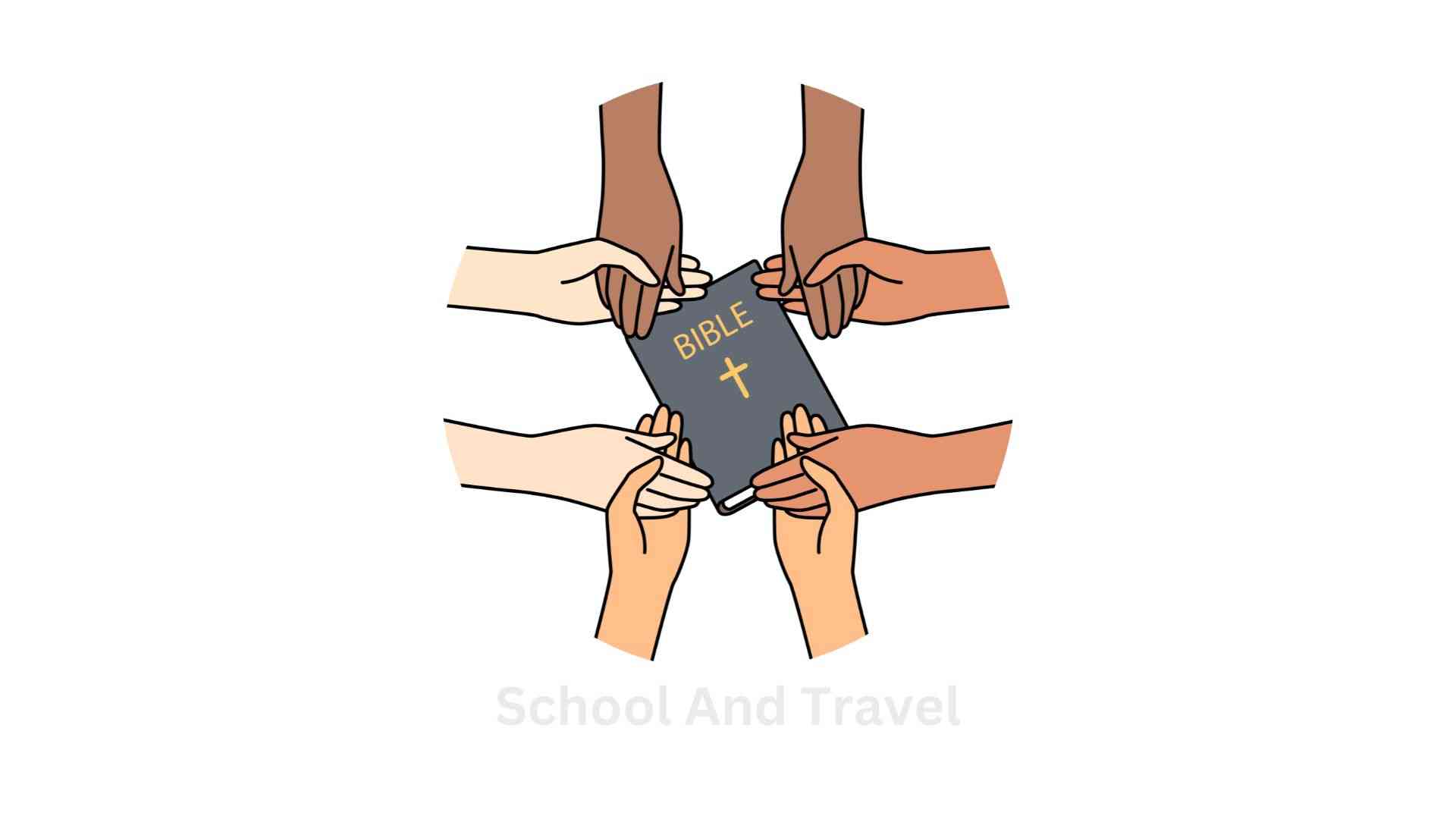Many questions about the Bible haven’t been answered because there isn’t enough evidence, there are different ways to understand it, or they touch on deep theological or existential questions that don’t have easy answers.
This article provides over 100 questions about the bible that can’t be answered:
| No | Question | Reason It Cannot Be Answered Definitively |
|---|---|---|
| 1. | Who wrote the Book of Hebrews? | Its authorship remains anonymous. |
| 2. | Why two different creation narratives in Genesis? | It’s unclear why the narratives vary. |
| 3. | What happened to the Ark of the Covenant? | Historical and biblical records don’t specify. |
| 4. | Was Jonah’s story literal or allegorical? | Different interpretations exist. |
| 5. | Who were the Nephilim? | Their exact nature remains a topic of debate. |
| 6. | Why differences in resurrection accounts in the Gospels? | Each Gospel has its own perspective. |
| 7. | Where was Jesus during the ‘missing years’? | The Bible doesn’t provide details. |
| 8. | What is the meaning of 666 in Revelation? | Multiple interpretations exist. |
| 9. | Was Adam and Eve’s story literal or symbolic? | Debated among theologians. |
| 10. | What is the “unpardonable sin”? | Exact interpretations vary. |
| 11. | How did Judas Iscariot die? | The accounts in the Gospels and Acts differ. |
| 12. | What happened to the Ten Lost Tribes of Israel? | Their fate remains uncertain. |
| 13. | How is an omnipotent, loving God consistent with evil? | Complex theological question with various perspectives. |
Questions About the Bible That Cannot be Answered
| No | Question | Reason It Cannot Be Answered Definitively |
|---|---|---|
| 14. | Was the Tower of Babel a real structure? | The exact historical existence and location are debated. |
| 15. | What is the “thorn” in Paul’s side he refers to? | Paul doesn’t specify what the “thorn” actually is. |
| 16. | Who are the “sons of God” in Genesis 6? | Multiple interpretations exist; unclear exact meaning. |
| 17. | Why do the genealogies of Jesus in Matthew and Luke differ? | Each Gospel author had different sources or intentions. |
| 18. | Were there other books that should’ve been in the Bible? | Debate about the canonical process and which books were included/excluded. |
| 19. | What is the exact nature of the Holy Trinity? | Deep theological concept with various interpretations. |
| 20. | Where did Cain get his wife? | The Bible doesn’t provide explicit details. |
| 21. | How did the Red Sea part for Moses? | The mechanism isn’t detailed; seen as a divine miracle. |
| 22. | What are the waters above the heavens in Genesis? | Ancient cosmological concept; exact nature is debated. |
| 23. | How old is the Earth according to the Bible? | Varying interpretations of biblical genealogies and days of creation. |
| 24. | Is the Song of Solomon a romantic poem or an allegory? | Both interpretations exist and are widely accepted. |
| 25. | What became of the disciples after Jesus’ ascension? | Not all disciples’ fates are detailed in scripture. |
| 26. | Why is the Book of Enoch referenced but not in the Bible? | Canonical decisions; it’s considered apocryphal. |
| 27. | Why did God ask Abraham to sacrifice Isaac? | Theological debate over God’s test and its implications. |
| 28. | What did Jesus do during the three days after his death? | Scripture offers limited information; theological interpretations vary. |
| No | Question | Reason It Cannot Be Answered Definitively |
|---|---|---|
| 29. | Why did God create the tree of knowledge? | Theological interpretations vary on its purpose. |
| 30. | What was manna exactly? | Its exact nature and composition are not detailed. |
| 31. | Who is the “beloved disciple” in John’s Gospel? | The identity isn’t explicitly stated in the text. |
| 32. | How could Noah fit all animals on the Ark? | Debate over the Ark’s size, animal types, and logistics. |
| 33. | What is the “sea of glass” in Revelation? | Its representation and physical nature are debated. |
| 34. | Who are the 144,000 in Revelation? | Multiple interpretations about their identity and role. |
| 35. | Why did Jesus curse the fig tree? | Varying interpretations of this symbolic act. |
| 36. | What did Solomon’s Temple look like exactly? | Detailed descriptions exist, but reconstructions vary. |
| 37. | Who was the Queen of Sheba? | Her exact identity and origin are debated. |
| 38. | Why are dragons mentioned in the Old Testament? | The term may have different meanings or translations. |
| 39. | What are the “keys to the kingdom” given to Peter? | Varying theological interpretations of their purpose and scope. |
| 40. | Why was Jesus baptized? | Different theological interpretations about its significance. |
| 41. | What is the “new heaven and new earth” in Revelation? | Different views on whether it’s literal or symbolic. |
| 42. | Why were some disciples called by two names? | Cultural and historical reasons, but not always detailed. |
| 43. | Were there other “Christs” or “Messiahs” at Jesus’ time? | Historical records suggest others claimed messianic roles. |
Questions About the Bible That Can’t be Answered
| No | Question | Reason It Cannot Be Answered Definitively |
|---|---|---|
| 44. | Why did God harden Pharaoh’s heart? | Theological interpretations about divine intervention vary. |
| 45. | What were Jesus’ activities as a child and young adult? | Scripture provides limited details on Jesus’ early life. |
| 46. | How was Mary Magdalene related to Jesus? | While close, exact nature of relationship is debated. |
| 47. | Why is the concept of the Trinity not explicitly mentioned in the Bible? | Derived from multiple passages; theological interpretation. |
| 48. | Was the Serpent in Eden Satan or simply a serpent? | Interpretations vary; not explicitly labeled as Satan in Genesis. |
| 49. | Why are some Bible verses in brackets or footnotes in modern translations? | Variations in ancient manuscripts; translation choices. |
| 50. | What is the Apocalypse really about? | Diverse interpretations; literal events, symbolism, or both? |
| 51, | How should the “days” in Genesis be interpreted? | Literal 24-hour periods, or longer epochs? Theological debate. |
| 52. | Where is Paradise or Abraham’s Bosom? | Location or state is not explicitly detailed. |
| 53. | What does the Bible say about other planets or life elsewhere? | Bible doesn’t directly address extraterrestrial life. |
| 54. | Why did Lot’s wife turn into a pillar of salt? | Varying interpretations of this event and its symbolism. |
| 55. | What are the “waters” God divides in Genesis? | Ancient cosmological views; exact nature is debated. |
| 56. | How did Daniel interpret dreams with such precision? | Divine revelation or wisdom, but mechanisms aren’t detailed. |
| 57. | Why is there a seeming contradiction in the Gospel genealogies of Jesus? | Different sources, purposes, or theological emphases. |
| 58. | What happened to Lazarus after his resurrection? | The Bible doesn’t detail the rest of his life post-resurrection. |
| No | Question | Reason It Cannot Be Answered Definitively |
|---|---|---|
| 59. | Who were the “wise men” or “Magi” visiting Jesus? | Their exact identities and origins are not detailed. |
| 60. | Why isn’t the Gospel of Thomas in the canonical Bible? | Canonical decisions were based on various criteria, some debated. |
| 61. | What was Paul’s “thorn in the flesh”? | Paul’s descriptions are vague, leading to speculation. |
| 62. | How could people in Genesis live for hundreds of years? | Interpretations vary: Literal ages, symbolic numbers, or other factors? |
| 63. | Where exactly is the Garden of Eden located? | Descriptions are general; exact location remains speculative. |
| 64. | Was the story of Job historical or allegorical? | Debates persist about its genre and intended message. |
| 65. | Why did Jesus speak in parables? | While reasons are given, the full scope of this method is explored theologically. |
| 66. | Who was the “suffering servant” in Isaiah? | Different interpretations: Israel, Jesus, Isaiah, or another figure? |
| 67. | Why are some animals considered “clean” or “unclean”? | Reasons are partly cultural, partly theological, and not always explicitly explained. |
| 68. | Who wrote the book of Ruth? | Its authorship is not specified in the text. |
| 69. | Why did God regret creating humans in Genesis? | Theological interpretations about divine emotions and intentions vary. |
| 70. | What are the “Stones of Fire” mentioned in Ezekiel? | Exact nature and reference are debated among scholars. |
| 71. | Where did Christ descend during the three days after crucifixion? | Various interpretations based on scattered references. |
| 72. | What happened during the “Silent Years” between the Old and New Testaments? | Bible doesn’t detail these ~400 years; info comes from external sources. |
| 73. | How can the differing accounts of Judas’ death be reconciled? | Different perspectives or emphasis in scriptures. |
Questions About the Bible That Can’t be Answered
| No | Question | Reason It Cannot Be Answered Definitively |
|---|---|---|
| 74. | Why does the Bible have two accounts of Saul’s encounter with David? | Parallel accounts with slight variations; reasons are debated. |
| 75. | How did the Apostle John die? | His death isn’t explicitly detailed in scripture. |
| 76. | Who was Melchizedek really? | His origins and nature are shrouded in mystery in the text. |
| 77. | Why was the Book of Revelation written in such symbolic language? | Interpretations vary; some say it’s coded due to persecution. |
| 78. | Why are some biblical books called “minor prophets”? | Not due to importance, but length; but why these specific texts? |
| 79. | How do the biblical and Egyptian chronologies align? | Complex topic with dating challenges and potential overlaps. |
| 80. | What is the “sin unto death” mentioned in 1 John? | Various theological interpretations exist. |
| 81. | Why doesn’t the Bible mention dinosaurs explicitly? | Terminology and knowledge differences; interpretations vary. |
| 82. | How should the “Sabbath” be observed according to the Bible? | Different denominations have various practices and interpretations. |
| 83. | Was the Apostle Paul ever married? | Scripture hints but doesn’t provide conclusive evidence. |
| 84. | Why are there differences in the biblical canon between denominations? | Historical, theological, and traditional factors play a role. |
| 85. | How literal is the description of Heaven in the Bible? | Varying interpretations between symbolic, literal, or a mix of both. |
| 86. | What are the “Books” mentioned in Revelation 20:12? | Exact nature and content of these books is debated. |
| 87. | How did Moses write about his own death in Deuteronomy? | Proposed answers include prophetic insight or later additions. |
| 88. | Why were the Israelites forbidden to eat pork? | Cultural, health, and symbolic reasons are proposed. |
Questions About the Bible That Can’t be Answered
| No. | Question | Reason It Cannot Be Answered Definitively |
|---|---|---|
| 88 | How did the Israelites maintain the Ark of the Covenant’s appearance over time? | Details about its upkeep are not extensively mentioned. |
| 89 | Why are the Ten Commandments different in different denominations? | Interpretation and division of the commandments vary. |
| 90 | Was the Prophet Isaiah referring to multiple individuals or one Messiah? | Passages in Isaiah lead to multiple interpretations. |
| 91 | Why was the Book of Jasher mentioned but not included in the Bible? | The nature and content of this book remain a mystery. |
| 92 | Why did the Apostle Paul have disputes with other disciples? | Not all reasons for disagreements are detailed in scripture. |
| 93 | Why aren’t there more writings directly from Jesus? | Scripture doesn’t specify why more of Jesus’ teachings weren’t recorded. |
| 94 | What did the early church look like in terms of structure and worship? | Scripture and historical records provide some but not full details. |
| 95 | Why are there different numbers of sacraments in Christian denominations? | Varies based on interpretation and tradition. |
| 96 | What is the “unforgivable sin” mentioned by Jesus? | Different theological interpretations exist, leading to debate. |
| 97 | Why did God command the Israelites to wipe out entire peoples in some Old Testament accounts? | Complex theological discussions about divine commands and morality. |
| 98 | What did Paul mean by “baptism for the dead”? | The phrase’s context and meaning in 1 Corinthians is debated. |
| 99 | How can the Bible’s references to the “four corners” of the earth be interpreted? | Ancient cosmological views vs. metaphorical language debate. |
| 100 | Why do some books in the Bible seem to end abruptly? | The original conclusion might be lost, or the author had reasons to end suddenly. |
| No. | Question | Reason It Cannot Be Answered Definitively |
|---|---|---|
| 100 | How was the long day of Joshua scientifically possible? | Scripture presents it as a miracle; exact mechanics aren’t detailed. |
| 101 | Why does the Bible not mention the years Jesus was between 12 and 30? | Scripture provides no extensive details on these “hidden” years. |
| 102 | Who was Cain’s wife? | The Bible doesn’t specify her origin or lineage. |
| 103 | What did Jesus mean when He said He’d return “soon”? | Interpretations of “soon” range from immediate to symbolic spans of time. |
| 104 | How were some books of the Bible lost or destroyed? | Historical events and decisions led to some texts being lost. |
| 105 | Why does the Bible not detail more on heaven? | Scripture provides glimpses, but comprehensive details are lacking. |
| 106 | Why were musical instruments controversial in worship in early Christian churches? | Scriptural interpretations and cultural practices influenced opinions. |
| 107 | Why is there no clear Bible stance on some modern issues? | Some issues are modern and weren’t directly addressed in ancient texts. |
| 108 | Why does the Bible have differing accounts on the number of animals Noah took on the Ark? | Different textual traditions and interpretations lead to variances. |
| 109 | What did Jesus look like? | Scripture doesn’t provide a detailed physical description. |
| 110 | Why did God ask Abraham to sacrifice Isaac? | Deep theological implications; testing faith vs. symbolism. |
| 111 | Who are the “sons of God” in Genesis 6? | Interpretations range from angelic beings to lineage of Seth. |
| 112 | Why isn’t there a clear account of Jesus’ life between his resurrection and ascension? | Scripture provides limited details on this 40-day period. |
| 113 | Was Jonah’s account inside the fish allegorical or literal? | Debate exists about the genre and intended message of the book. |
| 114 | Why are some of Jesus’ teachings seemingly paradoxical? | Teaching methods, cultural context, and deep spiritual meanings are factors. |
| No. | Question | Reason It Cannot Be Answered Definitively |
|---|---|---|
| 115 | What happened to the Ark of the Covenant? | Its final location or fate is not conclusively detailed in scripture. |
| 116 | How could Peter walk on water, even briefly? | Described as a miracle; specific mechanics are not detailed. |
| 117 | Why were some disciples called by multiple names? | Cultural naming practices; some had both Hebrew and Greek names. |
| 118 | Why did God allow the Israelites to have kings if He was their king? | Complex interplay of Israelite demands, divine will, and providence. |
| 119 | Why are there different accounts of the creation in Genesis chapters 1 and 2? | Literary structures, emphasis, and sources lead to different interpretations. |
| 120 | Why does the Bible not specify the fruit from the tree of knowledge? | The emphasis might be on the act of disobedience, not the fruit itself. |
| 121 | How did early Christians view the end times? | Diverse views, some expecting an imminent return of Christ. |
| 122 | Why are there differing accounts of the same parables in different Gospels? | Each Gospel writer had a specific audience and emphasis. |
| 123 | Why is the tribe of Dan not listed among the 144,000 in Revelation? | Theological interpretations vary, with some linking to idolatry in Dan’s history. |
| 124 | Were there dinosaurs on Noah’s Ark? | Interpretations vary based on views of biblical timelines and paleontology. |
| 125 | Why were certain miracles performed by Jesus and not others? | Reasons behind Jesus’ specific miracles often tied to immediate needs and broader messages. |
| 126 | Why did God choose Israel as His chosen people? | While there’s theological context, the full depth of divine choice remains a matter of faith. |
| 127 | What was the “manna” that fed the Israelites in the desert? | Described as a miraculous provision; its exact nature is unknown. |
| 128 | What is the significance of the number 7 in the Bible? | It often symbolizes completeness or perfection, but interpretations vary by context. |
| 129 | How were large structures like Solomon’s Temple built without modern machinery? | Ancient construction methods, possibly detailed in now-lost sources. |
FAQs on Questions About the Bible That Can’t be Answered
The Bible is an ancient collection of texts written by multiple authors over centuries. Given its age, diverse literary genres, and cultural contexts, certain elements can be open to interpretation. The Bible also addresses profound spiritual and moral questions that often don’t have simple or direct answers, leading to various interpretations over time.
Many believers argue that unanswered questions don’t diminish the Bible’s reliability. Instead, it underscores the text’s depth, complexity, and richness. These questions can invite deeper study, reflection, and engagement with the Scriptures.
Unanswered questions are text elements that don’t have clear or definitive explanations, often due to a lack of detail or context. Contradictions, on the other hand, are perceived inconsistencies within the text. However, what some see as contradictions, others interpret as complementary accounts or differing emphases.
Not at all. The Bible has been a subject of study and contemplation for millennia, and even the most seasoned theologians encounter passages that provoke questions and wonder. Many find that engaging with these questions deepens their understanding and appreciation of the Bible. It’s always a good idea to seek out trusted sources, commentaries, or mentors to further discuss and explore these questions.
Conclusion
The Bible is a profound text with deep mysteries. Some questions remain unanswered, inviting continuous study, reflection, and respect for its rich complexities and spiritual insights.
Awesome one; I hope this article answers your question.
Editor’s Recommendations:
- 79+ General Knowledge Questions For College Students
- 203+ General Knowledge Questions For Scholarship Exams
- 79+ General Knowledge Questions About The World (FAQs)
- 74+ Questions On General Knowledge For High School Students
- 109+ Possible Questions in Scholarship Exam (Tips, FAQs)
- 71+ Scholarship Exam Questions And Answers for College Students
- What Happens If You Fail The AP Exam? (Questions, FAQs)
- How To Answer Situational Interview Questions (FAQs)
If you find this article good, please share it with a friend.





